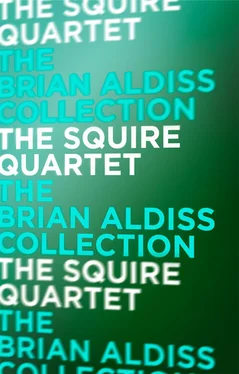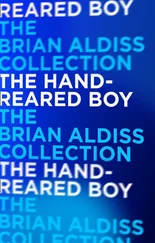‘Come on, Uncle,’ Dobson said. ‘No one knows what solicitors think about.’
‘Increasingly, waitresses,’ said Uncle Willie, with a laugh. ‘This place used to be a Red Cross shop during the war. Did I ever tell you that? Then it became an antique shop. That didn’t last.’
‘I remember the antique shop,’ Squire said. ‘I bought about ten garage signs from the dealer, including a Redline Glyco and a Pratt’s High Test, enamel on tin. We used them in the Pop Expo.’
‘Your father used to chase waitresses,’ Uncle Willie said, ignoring Squire’s remark. ‘There’s always been a sort of naughty streak in the Squire family, I’m sorry to say. That is why we don’t get on with the branch of the family at King’s Lynn – the Decent Dobsons. Except you, Nick. Do you take after your father, Tom?’
John Matthew Squire, his father, had been a countryman, like most of the family in that generation, involved in the affairs of the village and the county. John Squire seldom moved beyond those self-imposed boundaries except when, following the steps of the ancestor whose name he bore, he joined the Royal Norfolk Regiment and went to fight for four years in the assorted muds of Europe, returning home to Hartisham with the rank of major, saying, ‘It was quite a good scrap while it lasted.’
Somewhere along the way, John Squire acquired several tastes which led to his downfall. He acquired a taste for art. To the dogs and horses which were his life, he added the Norwich School of painters. They were local men, they painted local things and were faithful to them, not prettifying too much. With his favourite mastiffs at his heels, John Squire became a notable figure as he toured the country, attending markets and, just as assiduously, dusty old shops and attics. Where he went, his son Tom also went. Together, while the dogs prowled round them, father and son acquired a commendable gallery of watercolours and oils by Old Crome, Stoddart, the incomparable Cotman, and others.
‘Tractors may drive out Shire horses,’ John said, ‘but Cotman is permanent.’
Pippet Hall estate, in financial difficulties after the Great War, became more neglected as the art excursions ranged further afield. John’s red-haired wife, Patricia, was left to supervise the farm and bring up her other two children, Adrian and Deirdre.
John and his son Tom stayed overnight in country inns as they went on what John called their ‘Grand Tours’. The Morris and the mastiffs would be housed in the stables – very few Norfolk inns expected motor cars in the thirties. Tom would often be tucked into a wooden bed in some attic room; his cheek was scoured by a stiff military moustache as his father kissed him good-night, before disappearing below to join whatever company the bar offered; he disappeared with particular promptness if there were women downstairs.
Sometimes the boy would wake in the summer mornings early and run to the window of the strange room, to gaze out at a panorama of rushes and broads, busy bird life, and little boats already launching into the early golden haze over the waters. He always remembered an inn on Hickling Broad, where there was a tame magpie, and he and his father swam naked in the broad before breakfast.
John Squire had a taste also for jazz and popular dance music. Gramophone records began to accumulate at Pippet Hall. Patricia liked that. The records were played on a wind-up gramophone with a huge horn. When Tom and his brother and sister were small, many visitors came to the Hall, attracted by the happy-go-lucky nature of their parents. The visitors sometimes danced to the music of the gramophone, which Tom was allowed to wind. He watched his father as he took his beautiful wife about the waist and whirled her round the entrance hall, where the floor was good for fox-trots.
There was another taste, and one which slowly mastered the master of Pippet Hall. John progressed from being a heavy social drinker to being a heavy drinker. It was that habit which brought about his death, one rainy day in March 1937, when the rest of the family was out of the house.
Tom returned home in the afternoon. The solemn ticking silence warned him that something was wrong. He flung his cap down and ran straight to his father’s study. His father lay in one corner of the study, against a smashed picture frame, the glass of which littered the carpet. It was established later that he must have fallen over the mastiffs while the worse for drink. Both dogs had attacked him. They lurked in the opposite corner of the room, chops still bloody. Their master’s throat had been ripped away, and the flesh of his face torn off.
The dogs sulked behind John Squire’s armchair, knowing their crime. John’s son, aged eight, took down one of his father’s double-barrelled shotguns from the rack by the door, loaded it, and shot both animals through their skulls at close range. Blood and brains spattered in parabolas across the wallpaper. Then he dropped the gun and ran away into the plantation, where he huddled at the foot of a young oak until one of the farm labourers found him after dusk.
It was hard to tell where Uncle Willie’s remarks led, or indeed if they were intended to lead anywhere. He rambled as they drank their coffee, mainly about the ‘naughty streak’ in the family.
‘I don’t think I chase waitresses obsessively, Uncle Willie,’ Squire said.
‘Well, you enjoy a busy life, that I know. When success carries a man beyond family and native heath, he loses his sense of reality. I always say it. A protective sense of reality. A man’s achievements in the material world are often seen to be counterbalanced by deterioration in his personal happiness. Supposing our waitress to marry the Prince of Wales tomorrow, she would undoubtedly come to look back on her humble days in this coffee shop as a time of security and happiness. However she may see the matter now.’
‘It’s not like you to recommend a dull way of life as a paradigm of better things.’
Nicholas Dobson snorted, as if he knew his uncle better, but Willie ignored him.
The old man wiped his lips on the white handkerchief. ‘Don’t be angry, Tom, I’m only offering a warning.’
‘I’ve managed to look after my own affairs fairly well so far. Why don’t you approve?’
Willie looked offended. ‘You are making connections between things I did not intend. That’s always your clever habit of thought, I understand that.’
‘What are you accusing me of?’
Uncle Willie stuck his pipe in his mouth and began lighting it. He said, behind a cloud of smoke, ‘You want to stay home a bit more – that was your father’s mistake.’
Squire leaned forward so that the people sitting at the next table did not hear what he said. ‘Father would have approved strongly of my present work. I care deeply about it, I wouldn’t care if I never went back to the firm. It’s little enough, but I’m good at it, I think. In me there’s a lot of the family’s romanticism. I want to make a contribution to the thought of our country, I want to produce a cultural statement which I believe will help England, and maybe the rest of the world, to live more fully despite its present difficulties. I want to make everyone aware of the immense riches round about them in everyday life.’
‘Through TV? Through television? What can you do for television viewers? You can’t make them switch the set off, can you? I’ve no time for it. Fat lot it has to do with individual life. Paralysis, more to the point.’
With spirit, Squire said, ‘I believe that television has much to do with individual life. Continual box-watching is sad, I agree, sad because it shows you how lacking in opportunities is the average life. But television touches everyone as no art medium has ever done; it represents the triumph of photography, and the wonder is that it’s as good as it is. It must be respected. Why not respect it, develop it, now, rather than mourn for it when it is superseded, as no doubt it will be?’
Читать дальше












